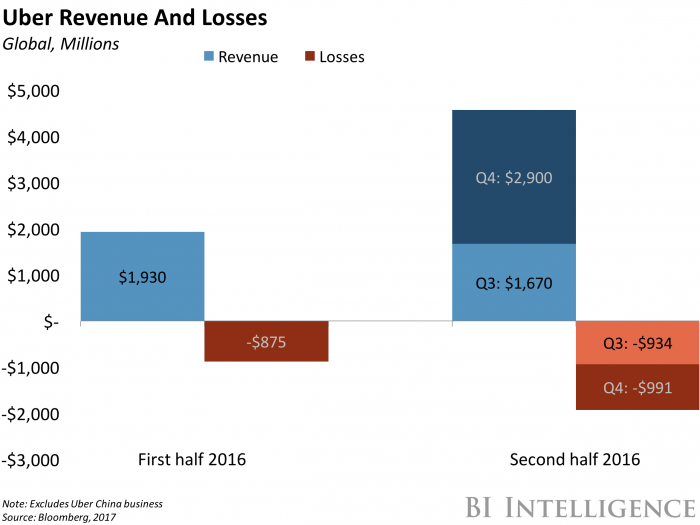Here's what to make of Uber's flying car ambitions

BI Intelligence
This story was delivered to BI Intelligence IoT Briefing subscribers. To learn more and subscribe, please click here.
Uber plans to test flying cars by 2020 in Dallas and Dubai, and hopes to offer a commercial service in those markets three years later, the BBC reports. The ridesharing giant is working with aircraft makers Embraer and Bell Helicopter to develop the technology.
There's no word yet on what the cars will look like, but the flying transport drones that the UAE government plans to deploy in Dubai this summer, which essentially resemble cars with propellers and carry just one person, could provide a clue.
There won't likely be flying cars outside your windows anytime soon. In the US, the Federal Aviation Administration (FAA) forbids drones from flying outside the operator's line of sight without special permission — primarily because of the safety hazards drones might pose to other aircraft, like airplanes and helicopters. Flying cars will likely face similar, if not more stringent, regulatory hurdles. And that's to say nothing of the massive technological challenges involved.
But with Uber, anything's possible.
It's willing to take massive losses to be the first to get new products to market. The company pioneered ride sharing and was one of the first to bring self-driving cars to public roads in the US, and the company's recently revealed financial statements showed that it lost nearby $2 billion in the second half of 2016 alone. As a result, it's not a that much of a stretch to wonder if the company could be willing to take a similar approach to make flying taxis a reality as well.
Don't be surprised if the company starts laying the groundwork sooner rather than later. This is a lofty goal to say the least, so Uber will need to start ramping up if it wants to even come close. As a result, seeing the company try to secure a patent, develop a proof of concept, or hire dedicated engineers for the project relatively soon could be within reach.
The self-driving car is no longer a futuristic fantasy. Consumers can already buy vehicles that, within a few years time, will get software updates enabling them to hit the road without the need for a driver.
This autonomous revolution will upend the automotive sector and disrupt huge swaths of the economy, while radically improving energy efficiency and changing the way people approach transport around the world.
Automakers and tech companies are racing to develop the technology that will power self-driving cars in the coming years. That tech is advancing, but leaves observers with a bigger question: will consumers trust driverless car tech, and will they want to use autonomous cars?
Peter Newman, research analyst for BI Intelligence, Business Insider's premium research service, has compiled a detailed report on self-driving cars that analyzes the market, and forecasts vehicle shipments and market penetration. It also profiles the players expected to take on a prominent role in the autonomous future, examines the barriers to autonomous car development and adoption, and reviews developments in technology, regulation, and consumer sentiment. Finally, it analyzes the impact the introduction of autonomy will have on various industries and transport trends.
Here are some of the key takeaways from the report:
Self-driving cars are coming; there will be fully autonomous cars on the roads in the US in 2018, and adoption will just take off from there.
The technology is developing swiftly to allow fully self-driving vehicles, while the regulatory environment is adapting to the anticipated changes that this new technology will bring.
We conducted a survey asking our exclusive BI Insiders panel about their thoughts on self-driving cars, the future of the automotive industry, and the impact autonomous vehicles will have on their purchasing habits moving forward. The results provide a picture of consumer sentiment at the precipice of the autonomous era.
In full, the report:
Sizes the current and future self-driving car market, forecasting shipments and projecting installed base.
Explains the current state of technology, regulation, and consumer perception.
Analyzes how the development of autonomous cars will impact employment and the economy.
Interested in getting the full report? Here are two ways to access it:
Subscribe to an All-Access pass to BI Intelligence and gain immediate access to this report and over 100 other expertly researched reports. As an added bonus, you'll also gain access to all future reports and daily newsletters to ensure you stay ahead of the curve and benefit personally and professionally. >> START A MEMBERSHIP
Purchase & download the full report from our research store. >> BUY THE REPORT
See Also:

 Yahoo News
Yahoo News 

